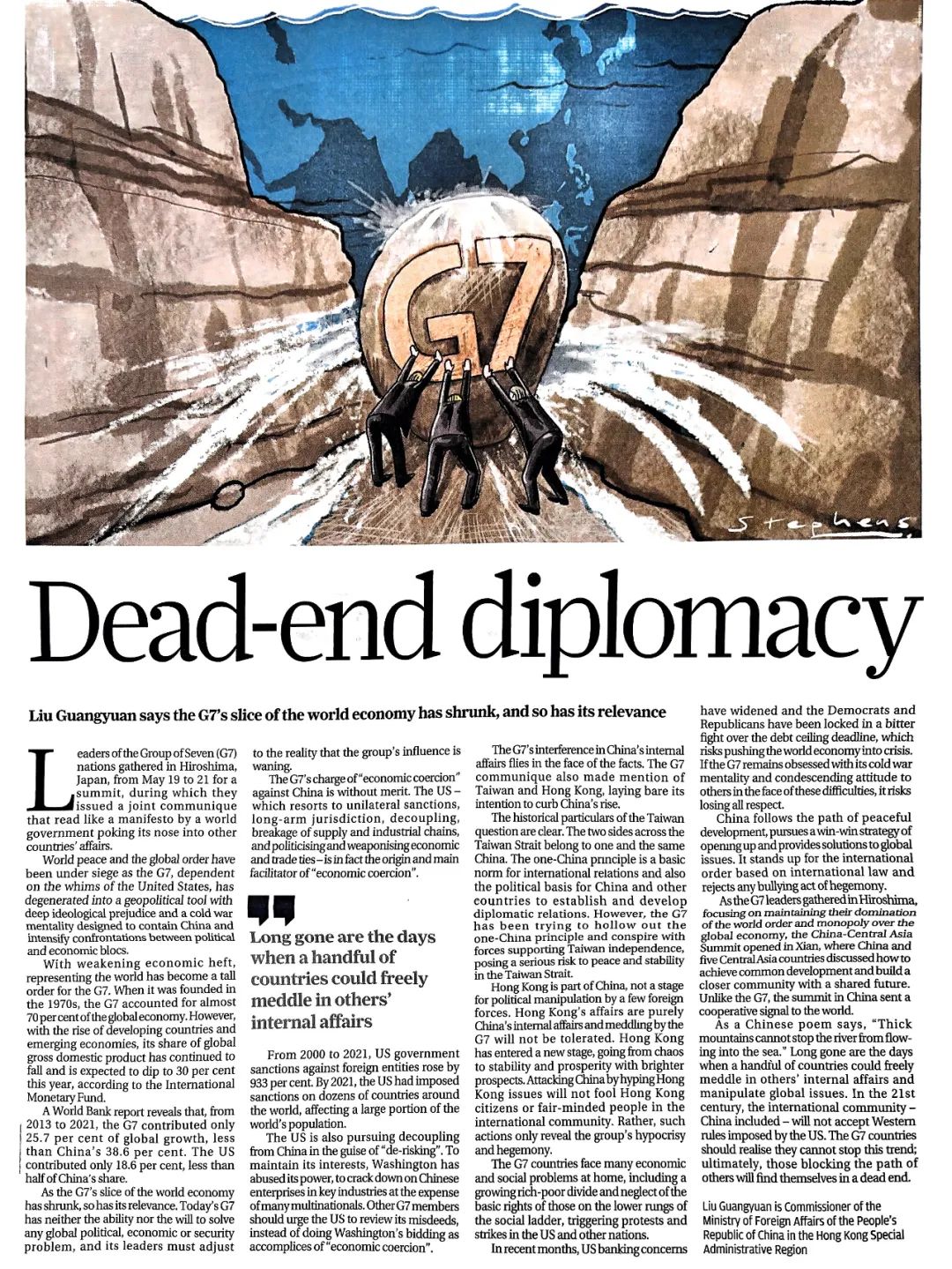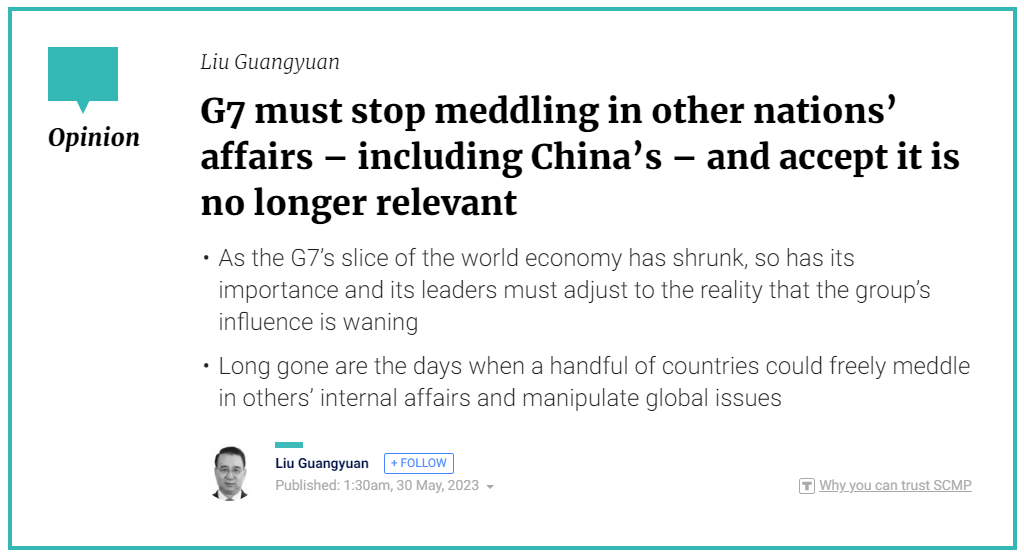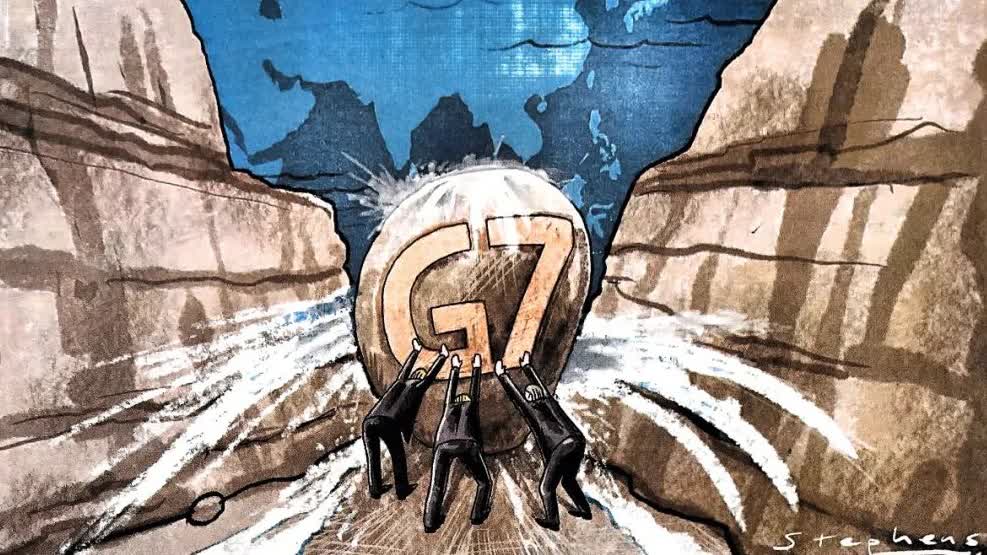劉光源署名文章:禍亂世界的七國集團峰會可以休矣

大公文匯全媒體報道,5月30日,外交部駐港公署劉光源特派員在《南華早報》發表題為《禍亂世界的七國集團峰會可以休矣》的英文署名文章,強調七國集團代表不了國際社會,其指責中國「經濟脅迫」純屬倒打一耙,干涉中國內政的言行違背事實道義,敦促七國集團不要再開歷史倒車。文章當日亦在該報網頁版刊登。全文如下:
禍亂世界的七國集團峰會可以休矣
近日,七國集團領導人齊聚日本廣島舉行峰會,並發表所謂「聯合聲明」,儼然以「世界政府」自居。他們的言論實質上在分裂國際社會、遏制中國發展。近年來,在美國主導下,七國集團意識形態色彩和冷戰氣息不斷加重,日益成為策動陣營對抗的地緣政治工具,給世界和平及國際秩序帶來嚴重衝擊。

七國集團代表不了國際社會,早已外強中乾。上世紀70年代成立之初,七國集團佔全球經濟70%的份額,被視為「富國俱樂部」。隨着廣大發展中國家和新興經濟體群體性崛起,七國集團經濟總量佔全球比重不斷下滑,據國際貨幣基金組織估計,這一比重今年將降至30%。世界銀行報告顯示,從2013年到2021年,七國集團對世界經濟增長的貢獻率總和僅為25.7%,不及中國的38.6%,美國貢獻率僅為18.6%,不及中國一半。如今的七國集團已是過時黃花、垂垂老矣,既無能力更無意願解決任何全球性政治經濟安全問題,卻仍心比天高,妄想代表國際社會,只能說是錯估了自身分量,也誤讀了時代潮流。
七國集團指責中國經濟脅迫,純屬倒打一耙。要論「經濟脅迫」,這頂帽子無疑最適合美國來戴。長期以來,美國大搞單邊制裁、「脫鉤斷鏈」,動輒將經濟問題泛化、意識形態化、武器化,以「去風險化」為名行「去中國化」之實,是世界經濟穩定發展的頭號破壞者和國際社會最大的經濟脅迫者。據統計,從2000年到2021年,美國政府對外制裁猛增933%。截至2021年,美國已對全球近40個國家實施制裁,影響全球近一半人口。近年來,為維護自身霸權利益,美國濫用國家力量打壓中國企業,窮盡手段在關鍵產業領域對中國進行圍追堵截,眾多跨國企業都成為美國經濟脅迫的受害者。七國集團理應敦促美國檢討自身經濟脅迫惡行,而不是配合美國玩「賊喊捉賊」的把戲,給別國亂扣帽子。
七國集團粗暴干涉中國內政,違背事實道義。七國集團所謂「聯合聲明」對台灣問題、香港問題等指手畫腳,字裏行間充斥着反華遏華的險惡用心。台灣問題的歷史經緯明明白白,兩岸同屬一個中國的事實和現狀清清楚楚。一個中國原則是公認的國際關係基本準則,也是中國和其他國家建立和發展外交關係的政治基礎。然而,美國為首的七國集團不斷歪曲虛化掏空一個中國原則,變相支持縱容「台獨」勢力,企圖「以台制華」,嚴重衝擊台海和平穩定。香港是中國的香港,不是少數魑魅魍魎為所欲為的「政治秀場」,香港事務純屬中國內政,七國集團無權橫加干涉。如今的香港進入由亂到治走向由治及興的新階段,發展前景更加光明,借香港問題指責中國完全是顛倒黑白,煽惑不了心明眼亮的香港市民,蠱惑不了國際社會的有識之士,只會讓世人更加看清七國集團的無恥蠻橫。
近年來,七國集團各國內部問題叢生,遊行、罷工此起彼伏,社會矛盾愈演愈烈,根源在於社會不公平不公正,在於民眾的基本權利被忽略被輕視。近期美國債務上限僵局難解,多家銀行相繼「爆雷」,令全球經濟承受重壓,美國兩黨卻還在相互推諉、甩鍋。面對重重困境,美國為首的七國集團不檢視自身問題,反而「自己生病,硬要讓別人吃藥」,依然醉心於冷戰思維,執迷於吆五喝六的「教師爺」做派,到頭來只會既丟了體面,也淪為笑談!
中國始終走和平發展道路,奉行互利共贏的開放戰略,堅定維護以國際法為基礎的國際秩序,反對任何霸淩霸權霸道行徑,不斷為解決全球問題和促進世界發展提供中國方案。在七國集團峰會舉行之際,中國—中亞峰會在西安隆重舉行,各方共敘傳統友誼,共謀未來發展,共同推動構建更加緊密的命運共同體。兩相對比,高下立判。
「青山遮不住,畢竟東流去。」七國集團應該意識到,肆意干涉別國內政、操縱全球事務的時代已經一去不復返了。在21世紀的今天,中國決不接受少數國家強加罪名、亂扣帽子,國際社會也不會接受美國主導的所謂「西方規則」。忠言逆耳,奉勸七國集團不要再執迷不悟開歷史倒車,企圖堵住別人的路,到頭來只會堵死自己的路。
Dead-end Diplomacy
Leaders of the Group of Seven (G7) nations gathered in Hiroshima, Japan, from May 19 to 21 for a summit, during which they issued a joint communique that read like a manifesto by a world government poking its nose into other countries’ affairs.
World peace and the global order have been under siege as the G7, dependent on the whims of the United States, has degenerated into a geopolitical tool with deep ideological prejudice and a Cold War mentality designed to contain China and intensify confrontations between political and economic blocs.
With weakening economic heft, representing the world has become a tall order for the G7. When it was founded in the 1970s, the G7 accounted for almost 70 per cent of the global economy. However, with the rise of developing countries and emerging economies, its share of global gross domestic product has continued to fall and is expected to dip to 30 per cent this year, according to the International Monetary Fund.
A World Bank report reveals that, from 2013 to 2021, the G7 contributed only 25.7 per cent of global growth, less than China’s 38.6 per cent. The US contributed only 18.6 per cent, less than half of China’s share.
As the G7’s slice of the world economy has shrunk, so has its relevance. Today’s G7 has neither the ability nor the will to solve any global political, economic or security problem, and its leaders must adjust to the reality that the group’s influence is waning.
The G7’s charge of “economic coercion” against China is without merit. The US – which resorts to unilateral sanctions, long-arm jurisdiction, decoupling, breakage of supply and industrial chains and politicising and weaponising economic and trade ties – is in fact the origin and main facilitator of “economic coercion”.
From 2000 to 2021, US government sanctions against foreign entities rose by 933 per cent. By 2021, the US had imposed sanctions on dozens of countries around the world, affecting a large portion of the world’s population.
The US is also pursuing decoupling from China in the guise of “de-risking”. To maintain its interests, Washington has abused its power to crack down on Chinese enterprises in key industries at the expense of many multinational companies. Other G7 members should urge the US to review its misdeeds, instead of doing Washington’s bidding as accomplices of “economic coercion”.
The G7’s interference in China’s internal affairs flies in the face of the facts. The G7 communique also made mention of Taiwan and Hong Kong, laying bare its intention to curb China’s rise.
The historical particulars of the Taiwan question are clear. The two sides across the Taiwan Strait belong to one and the same China. The one-China principle is a basic norm for international relations and also the political basis for China and other countries to establish and develop diplomatic relations. However, the G7 has been trying to hollow out the one-China principle and conspire with forces supporting Taiwan independence, posing a serious risk to peace and stability in the Taiwan Strait.
Hong Kong is part of China, not a stage for political manipulation by a few foreign forces. Hong Kong’s affairs are purely China’s internal affairs and meddling by the G7 will not be tolerated. Hong Kong has entered a new stage, going from chaos to stability and prosperity with brighter prospects. Attacking China by hyping Hong Kong issues will not fool Hong Kong citizens or fair-minded people in the international community. Rather, such actions only reveal the group’s hypocrisy and hegemony.
The G7 countries face many economic and social problems at home, including a growing rich-poor divide and neglect of the basic rights of those on the lower rungs of the social ladder, triggering protests and strikes in the US and other nations.
In recent months, US banking concerns have widened and the Democrats and Republicans have been locked in a bitter fight over the debt ceiling deadline, which risks pushing the world economy into crisis. If the G7 remains obsessed with its Cold War mentality and condescending attitude to others in the face of these difficulties, it risks losing all respect.
China follows the path of peaceful development, pursues a win-win strategy of opening up and constantly provides solutions to global issues. It stands up for the international order based on international law and rejects any bullying act of hegemony.
As the G7 leaders gathered in Hiroshima, focusing on maintaining their domination of the world order and monopoly over the global economy, the China-Central Asia summit opened in Xian, where China and five Central Asia countries discussed how to achieve common development and build a closer community with a shared future. Unlike the G7, the summit in China sent a cooperative signal to the world.
As a Chinese poem says, “Thick mountains cannot stop the river from flowing into the sea.” Long gone are the days when a handful of countries could freely meddle in others’ internal affairs and manipulate global issues. In the 21st century, the international community – China included – will not accept Western rules that are imposed by the US. The G7 countries should realise they cannot stop this trend; ultimately, those blocking the path of others will find themselves in a dead end.


























 字號:
字號:


評論